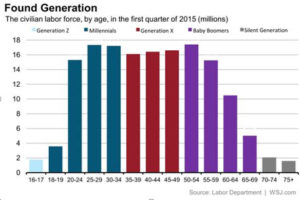Winning the hiring war
In my speaking engagements, I talk to hundreds of executives every year who gripe about their inability to attract and retain talent. In the war for hiring talent, most of them feel like they are losing. As of this writing, the United States is nearing full employment.
Even before the recent uptick in employment, employers were having difficulty finding skilled labor, or even reliable hourly labor. There are massive shortages for roles ranging from welders to data scientists.
I would surmise that we are trying to solve a problem using a dated playbook. It is no different than the U.S. using conventional warfare tactics against counterinsurgencies around the world. Like in those wars, this war on talent will require boots on the ground, and the right campaign to win over hearts and minds.
Can things get worse?
According to Pew Research (and published in the Wall Street Journal), a staggering 45 million baby boomers are within five years of the traditional retirement age. Workers with less than 12 years of experience comprise more than a third of the workforce. It is a simple math problem; there are not enough experienced workers to fill the funnel.

If those numbers are not troubling enough, try these on for size:
- The labor participation rate in the United States dropped to 63% in 2016.[i]
- While older boomers held an average of 11.7 jobs between the ages of 18 and 48, those born in the 1980s held 7.2 jobs from ages 18 to 28.[ii]
- The average tenure in the U.S. is 4.2 years, down from 4.6 in 2014.
- 79% of Millennials have student loans that “have a moderate or significant impact on their ability to meet their other financial goals.”[iii]
- According to Gallup, Millennials are by far the least engaged employees (29%).
So there are fewer people looking for work, they have less tenure and loyalty, and they are under immense financial pressure. Meanwhile, employment costs have skyrocketed as a result of spiraling health care costs, and higher minimum wages in urban areas (especially in the West). The administration’s immigration policy will certainly restrict access to low-cost labor.
All hands on deck
HR as a function, like marketing before it, is about to undergo a seismic shift.
There are specialized skills required to succeed in this war. For example, today’s environment demands online recruiters with social media savvy. One of the reasons companies do not have the right people in the right seats on the bus is that their HR people are not in the right seats. If there is a war on talent, we need all hands on deck.
Most companies employ the same tired script for HR:
- Hire an HR generalist for every 80-130 people
- Then, hire a VP
- Have those people cover it all- from payroll and wage to hour compliance and benefits
- Implement HRIS (human resources information system)
- Offer basic training and management classes
- Build an employer web page with a list of job openings
- Administer performance management
It’s not hard to understand why this script is falling woefully short. Today’s workers are looking for much more than a paycheck, or even skills acquisition. They want to be connected to something bigger than themselves. They need a purpose.
Executives point to their issues in hiring and retaining Millennials. We cannot ignore the importance of mastering the employment of younger workers for two reasons: Number one, they are probably smarter than us. They grew up during a time when schools were more competitive in subjects like math and science, and their ability to adapt and utilize technology is unmatched by my generation. Number two, the demographic shifts underfoot afford us no choice.
It is time to move to a new playbook:
Lead with purpose– There are two types of management teams: those who care about things like mission, values and vision statements, and those who go through the motions. Take your words seriously and ensure your employees understand how their contributions align with a purpose greater than themselves.
Invest in strong employer branding- It is not good enough to simply be an “employer of choice”. Great employers tell their stories online, through employee testimonials and the like. Videos are a very powerful medium for illustrating your culture.
Reinforce your culture every day- Talking about culture is not enough. Management needs to ingrain celebration of culture into all executive decisions. Remind employees again and again about the principles that are important to you.
Get HR out of the command center and onto the front line- if you are serious about being a great employer, invest in a world class HR leader who will dedicate more time to culture and less to compliance. Any HR generalist can do the latter.
Over communicate- Internal communication should be treated like external communication. Commonly, companies must repeat the same message 7 to 10 times to be heard by a prospect or customer. Employers must repeat messaging over and over again in order for it to resonate with staff.
Provide the best environment- While alternative work environments have spread like wildfire, there are still old-school managers who believe they must oversee their staff. If you don’t provide the most inviting workspace, including virtual environment, employees will gravitate elsewhere.
Embrace a continuous feedback loop- Conventional performance reviews are being replaced by more frequent feedback systems. Nonetheless, there’s no need to throw out the baby with the bathwater- employees still want to see their employers take their evaluations seriously. And, they want constant reinforcement. Utilize frequent one-to-ones to engage with them and keep them in the fold.
[i]Civilian labor force participation rates- U.S. Bureau of Labor Statistics
[ii] NLS New Release- Bureau of Labor Statistics
[iii] Employee Financial Wellness Survey- PricewaterhouseCoopers
Read more: Innovative ideas for hiring and keeping great people
Category: Hiring, Recruitment, Sourcing
Tags: Hiring, hiring strategy, talent planning

